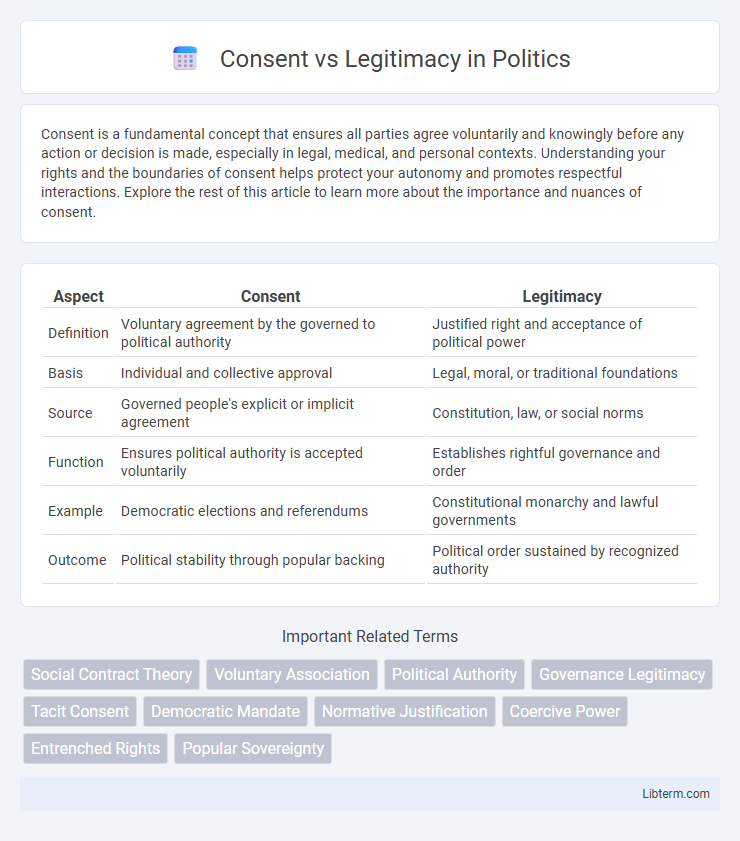Consent is a fundamental concept that ensures all parties agree voluntarily and knowingly before any action or decision is made, especially in legal, medical, and personal contexts. Understanding your rights and the boundaries of consent helps protect your autonomy and promotes respectful interactions. Explore the rest of this article to learn more about the importance and nuances of consent.
Table of Comparison
| Aspect | Consent | Legitimacy |
|---|---|---|
| Definition | Voluntary agreement by the governed to political authority | Justified right and acceptance of political power |
| Basis | Individual and collective approval | Legal, moral, or traditional foundations |
| Source | Governed people's explicit or implicit agreement | Constitution, law, or social norms |
| Function | Ensures political authority is accepted voluntarily | Establishes rightful governance and order |
| Example | Democratic elections and referendums | Constitutional monarchy and lawful governments |
| Outcome | Political stability through popular backing | Political order sustained by recognized authority |
Introduction to Consent and Legitimacy
Consent derives its power from voluntary agreement, establishing the foundation for lawful authority and social contracts. Legitimacy embodies recognition and acceptance of authority, often grounded in legal, moral, or traditional principles that justify power structures. Together, consent and legitimacy ensure governance is both authorized by the people and validated by accepted norms.
Defining Consent in Governance
Consent in governance refers to the authorized agreement or approval granted by the governed population, legitimizing the exercise of political power. It embodies the principle that legitimate authority arises from the explicit or implicit acceptance of laws and policies by citizens, ensuring government actions reflect the collective will. This foundational concept underpins democratic systems, where consent is continuously expressed through mechanisms such as voting, public participation, and civil liberties.
Understanding Legitimacy in Political Systems
Legitimacy in political systems refers to the recognized right of a governing body to exercise authority, rooted in legal frameworks, cultural norms, and public acceptance. Unlike consent, which is active and voluntary agreement by the governed, legitimacy encompasses broader acceptance, often institutionalized through constitutions, laws, and social contracts. Understanding legitimacy involves analyzing the sources of power, mechanisms of accountability, and the alignment between state actions and societal values.
Historical Perspectives on Consent and Legitimacy
Historical perspectives on consent and legitimacy reveal how governance systems have evolved from divine right and hereditary rule to popular sovereignty and social contract theories. Philosophers like John Locke and Jean-Jacques Rousseau emphasized consent as the foundation of legitimate authority, arguing that governments derive power from the governed's agreement. This shift toward consent-based legitimacy transformed the political landscape, influencing modern democratic principles and constitutional frameworks.
Sources of Political Consent
Sources of political consent primarily stem from social contract theory, democratic participation, and legal-rational authority, which collectively establish the legitimacy of governance. Consent is often derived through explicit methods like voting, referendums, and public endorsements, or through implicit acceptance manifested in social norms and compliance with laws. The distinction lies in legitimacy being recognized authority based on consent, tradition, or legal frameworks, whereas consent reflects the foundational approval or agreement from the governed populace enabling political power.
Building and Maintaining Legitimacy
Building and maintaining legitimacy requires aligning actions with societal values, governance principles, and legal standards to foster trust and acceptance from stakeholders. Consent involves explicit agreement, but legitimacy extends beyond consent by embedding authority within cultural norms and institutional frameworks, ensuring sustained compliance and support. Transparent decision-making, accountability mechanisms, and consistent ethical behavior are critical factors in reinforcing legitimacy over time.
The Interplay Between Consent and Legitimacy
Consent forms the foundation of legitimacy by ensuring authority is granted voluntarily by the governed, reflecting genuine approval and active participation. Legitimacy sustains consent through consistent alignment with societal values, legal norms, and ethical standards, reinforcing trust and compliance. The dynamic interplay between consent and legitimacy shapes stable governance by balancing authority with accountability and public endorsement.
Challenges to Achieving Both Consent and Legitimacy
Achieving both consent and legitimacy faces challenges such as conflicting interests between authorities and stakeholders, which can undermine trust and compliance. Diverse cultural, social, and political contexts complicate the establishment of universally accepted norms, making it difficult to secure genuine consent across all groups. Furthermore, misinformation and power imbalances often distort participatory processes, threatening the perceived legitimacy of decisions and institutions.
Case Studies: Consent vs Legitimacy in Practice
Case studies illustrating the tension between consent and legitimacy highlight scenarios where governmental authority is questioned despite popular support. For example, in the Brexit referendum, the legitimacy of the decision faced challenges due to disputes over the informed consent of the public and political legitimacy in implementation. Similarly, in South Africa, the transition from apartheid demonstrated how broad consent can legitimize new governance structures, emphasizing the dynamic interplay between public agreement and institutional authority.
Conclusion: Balancing Consent and Legitimacy for Stable Governance
Achieving stable governance requires a careful balance between obtaining citizen consent and maintaining legitimacy through fair laws and institutions. Consent ensures public support and participation, while legitimacy provides the legal and moral authority necessary for effective rule. Integrating both elements fosters trust, prevents authoritarianism, and sustains long-term political stability.
Consent Infographic

 libterm.com
libterm.com